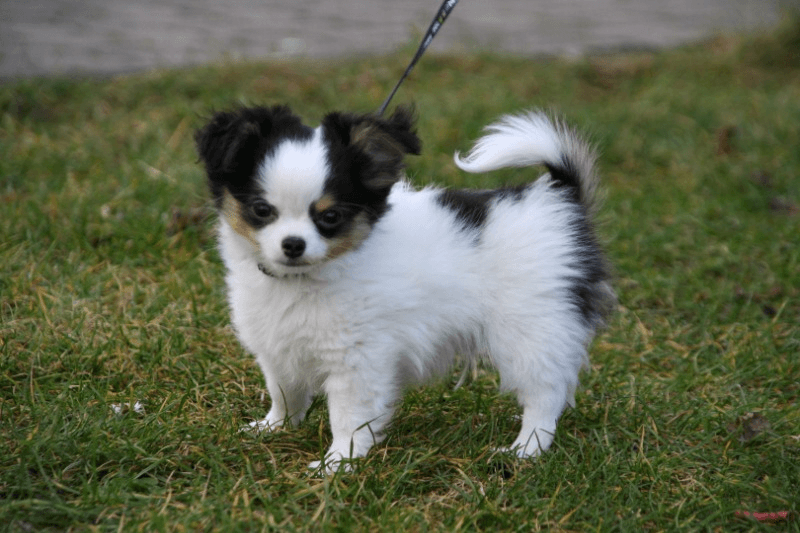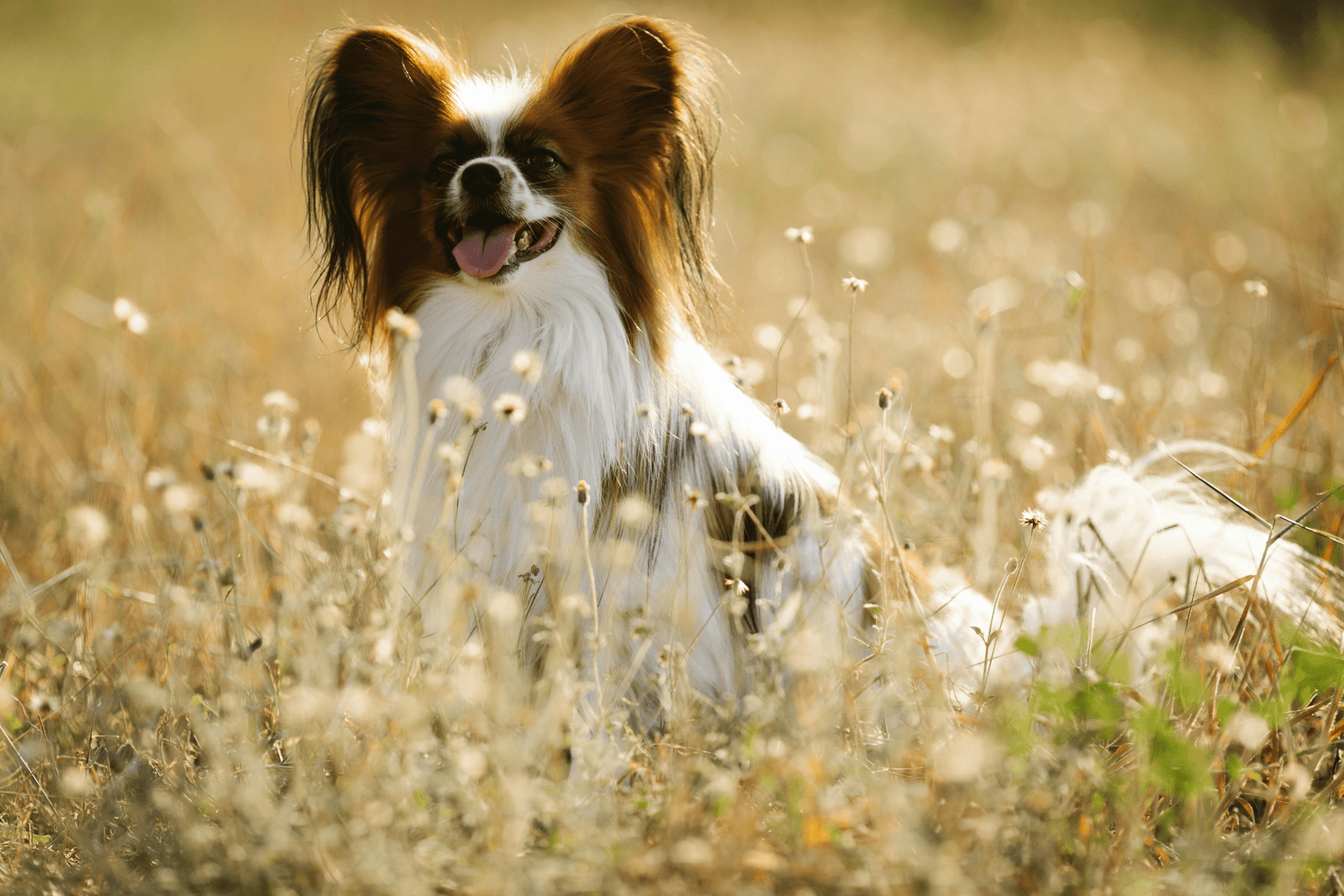The Papillon, a small yet vibrant toy breed, is renowned for its distinctive butterfly-like ears and dynamic personality. This breed, with a rich history dating back to the European courts, offers a unique combination of elegance and spirited playfulness. Ideal for families and individuals alike, the Papillon thrives in environments where it can engage in both physical activities and quiet companionship. Despite its petite size, this dog possesses a robust constitution, making it not only a delightful companion but also a versatile participant in various canine sports. With its intelligent gaze and agile movements, the Papillon stands out as a testament to the enduring appeal of small breeds in the vast world of dogs.
Key Takeaways
- Papillons are small, friendly dogs that make great pets for families and individuals alike, thanks to their adaptable and sociable nature.
- They require regular grooming and dental care to keep their long, silky coats and teeth healthy, highlighting the importance of routine health maintenance.
- Despite their size, Papillons are energetic and enjoy being active, so daily walks and playtime are essential for their physical and mental well-being.
- When considering adding a Papillon to your family, it’s important to seek reputable breeders or adoption agencies to ensure the health and happiness of your future pet.
- Living with a Papillon means having a lively, affectionate companion that thrives on attention and interaction, making them ideal for those who can dedicate time to their pet.
- Potential owners should be aware of the breed’s specific needs, including socialization and training, to fully enjoy the rewarding experience of owning a Papillon.
Breed Overview
History
The Papillon’s roots stretch deep into European soil, where it was once the darling of the aristocracy. This breed has graced the laps of queens and kings, its elegance captured in countless paintings and tapestries from the Renaissance period. The transformation from a droopy-eared Spaniel to today’s perky-eared Papillon is a fascinating tale of selective breeding. Over centuries, breeders favored the unique ear shape that resembles a butterfly’s wings, hence the name “Papillon,” French for butterfly.
Famous figures in history, including Marie Antoinette and Madame de Pompadour, were known to cherish their Papillons. These dogs weren’t just pets; they were symbols of wealth and status. Their long-standing popularity among high society underscores their enduring appeal.
Physical Characteristics
The Papillon is instantly recognizable by its butterfly-like ears, large and fringed with hair. This feature not only gives the breed its name but also contributes to its distinctive look. Despite their small size, Papillons are sturdy and fine-boned, fitting perfectly into the toy breed category.
They flaunt a variety of coat colors and patterns, ranging from solid shades to intricate markings. This diversity in appearance ensures that no two Papillons are exactly alike, each boasting its unique flair.
Personality and Temperament
Known for their alertness and intelligence, Papillons thrive on companionship and interaction. Their friendly demeanor makes them excellent family pets, always eager to join in activities or curl up for cuddles. This breed’s sharp intellect means they pick up on commands quickly, making training both rewarding and enjoyable.
Their adaptability is another standout trait; whether living in an apartment or a house with a yard, a Papillon will feel right at home as long as they’re with their beloved humans. However, it’s important to remember that these dogs crave attention and do not like being left alone for long periods.

Health And Care
Common Health Issues
Papillons, known for their elegance and vibrancy, can face health challenges that need attention. Patellar luxation, dental issues, and progressive retinal atrophy are common concerns. Regular veterinary check-ups play a crucial role in early detection and management of these conditions. They help ensure the well-being of these small but spirited dogs. Genetic testing offers insights into breed-specific conditions, guiding owners towards proactive health care.
Dietary Needs
A balanced diet fuels the high energy levels characteristic of Papillons. It’s essential to tailor their food intake to meet the needs of small breeds. Overfeeding can lead to obesity, a significant health risk for small dogs. A mix of dry and wet food not only supports dental health but also ensures proper hydration. Owners should be mindful of their pet’s dietary needs to maintain optimal health.
Exercise Requirements
Despite their petite size, Papillons possess surprising amounts of energy that require daily exercise to burn off. A combination of physical activities and mental stimulation keeps them healthy and engaged. Due to their curious nature, leash training and secure play areas are important to prevent them from wandering off during outdoor adventures.
Grooming
Papillons boast long, fine coats that demand regular brushing to avoid matting. Dental care is equally crucial in preventing the common dental issues this breed faces. Occasional professional grooming every few months helps maintain their coat’s health and appearance, ensuring these lively companions look as good as they feel.
Living with a Papillon
Training and Socialization
Early socialization is crucial for Papillons. It helps them overcome timidity and grow into well-adjusted adult dogs. Their intelligence and eagerness to please make positive reinforcement techniques highly effective. Treats and praises work wonders in teaching them new tricks and behaviors.
However, owners must be cautious of small dog syndrome. This can develop if they’re not properly trained and socialized. It leads to behavioral issues like excessive barking or aggression. Consistency in training from a young age prevents these problems.
Environment
Papillons thrive in environments that cater to their need for exercise and play. A house with a yard is ideal, but they also adapt well to apartment living with daily walks. Their small size and curiosity necessitate a safe, secure space to explore.
Their adaptability shines in various living situations, as long as their social and physical needs are met. Owners should ensure their living spaces are escape-proof, though, as Papillons can be quite the adventurers.
Activities They Enjoy
Agility training is perfect for Papillons. They excel in competitions thanks to their agility and intelligence. These activities also provide an excellent outlet for their energy.
Interactive toys and games keep their minds sharp. Puzzle toys, in particular, are great for mental stimulation. Regular play sessions with their owners not only provide exercise but also strengthen the bond between pet and owner.

Breeder Advice and Adoption
Choosing a Breeder
When seeking a Papillon puppy, finding a reputable breeder is crucial. Look for breeders who conduct comprehensive health screenings and genetic testing on their breeding dogs. These tests help prevent the transmission of hereditary diseases common in the breed.
It’s advisable to ask for references from previous buyers to gauge the breeder’s reliability. Meeting the puppy’s parents can also offer insights into your future pet’s temperament and health. Breeders who allow this interaction typically have nothing to hide regarding their breeding practices.
Choosing a breeder who prioritizes the health and well-being of their dogs over profit is essential. Such breeders are more likely to provide puppies that are not only physically healthy but also well-socialized, making them excellent companions for life.
Adoption
Adopting a Papillon from shelters or rescue organizations can be a rewarding alternative to purchasing from a breeder. Many Papillons end up in shelters through no fault of their own and await a second chance at happiness.
Before adopting, consult with a veterinarian to assess the dog’s health and temperament thoroughly. This step ensures you’re prepared for any medical care your new friend might need.
There are several benefits to adopting an adult dog. For starters, you bypass the demanding puppy stage, complete with teething and housebreaking challenges. Furthermore, an adult dog’s size and personality are already established, removing the guesswork involved when raising a pup.
Misc.
Popular Names
Choosing the right name for a Papillon can be as delightful as the breed itself. Elegant and lively names like Bella, Charlie, and Daisy perfectly capture their spirited nature. For those who appreciate the breed’s French origins, names such as Pierre, Coco, or Fleur add a touch of sophistication. Given their diminutive size and vivacious personality, playful names like Pixie or Spark are also fitting choices.
Fun Facts
The Papillon is not just any toy spaniel; it’s one of the oldest, with roots stretching back over 700 years. This breed has graced Renaissance art, symbolizing luxury and refinement among European nobility. Beyond their historical prestige, Papillons have made their mark in modern times too. They excel in dog sports like agility competitions, showcasing their intelligence and athleticism to the world.
Common Myths
Contrary to popular belief, Papillons are far from fragile. Their agility and robustness allow them to enjoy various physical activities without issue. While small in stature, they’re not typical lap dogs; they possess a bold and adventurous spirit that craves exploration. The notion that Papillons are high-strung is a misconception. With proper training and socialization, they exhibit a well-balanced temperament that makes them delightful companions.
Most Similar Breed
The Phalene stands out as the closest relative to the Papillon, mainly differing in ear carriage with its drop-eared appearance. Among toy breeds, the Pomeranian shares many traits with the Papillon including intelligence and liveliness. The Chihuahua is another similar breed in terms of size and energy levels but showcases distinct characteristics and temperament that set it apart.
Top Dog Grooming Tools (Click Here)
Closing Thoughts
The Papillon emerges as a breed known not only for its distinctive butterfly-like ears but also for its vibrant personality and adaptability. They require attentive care, particularly in health, grooming, and daily exercise, to maintain their vivacious spirit and well-being. The journey of living with a Papillon is enriched by understanding their needs and ensuring they are met through responsible breeding practices and proper adoption channels. Their companionship offers a unique blend of joy, agility, and affection, making them an excellent addition to many homes.
For prospective owners, the decision to welcome a Papillon into their life should be informed by thorough research and consideration of the breed’s characteristics and care requirements. Engaging with reputable breeders or adoption agencies ensures a healthy start for both the dog and owner. Ultimately, the bond formed with a Papillon is a rewarding experience, underscoring the importance of commitment and love in pet ownership. Those considering this breed are encouraged to proceed with knowledge, patience, and an open heart.
Frequently Asked Questions
What is the average lifespan of a Papillon?
Papillons typically live between 12 to 16 years. Proper care and regular veterinary check-ups can help ensure they live a full, healthy life.
How much exercise does a Papillon need?
Papillons require moderate exercise. Daily walks and play sessions are sufficient to keep them happy and healthy.
Are Papillons good with children?
Papillons can be good with children if properly socialized from an early age. However, their small size makes them more suitable for families with older children who know how to handle pets gently.
What are common health issues in Papillons?
Common health issues include dental problems, patellar luxation, and certain heart conditions. Regular vet visits are crucial for early detection and treatment.
How often should a Papillon be groomed?
Papillons require weekly brushing to prevent mats and tangles in their long, silky coat. They also benefit from regular ear cleaning and nail trimming.
Can Papillons live comfortably in apartments?
Yes, Papillons can adapt well to apartment living due to their small size and moderate exercise needs. They do, however, need daily activities to keep them engaged.
Is it difficult to train a Papillon?
No, Papillons are intelligent and eager to please, making them relatively easy to train. Consistency and positive reinforcement are key components of successful training sessions.







0 Comments